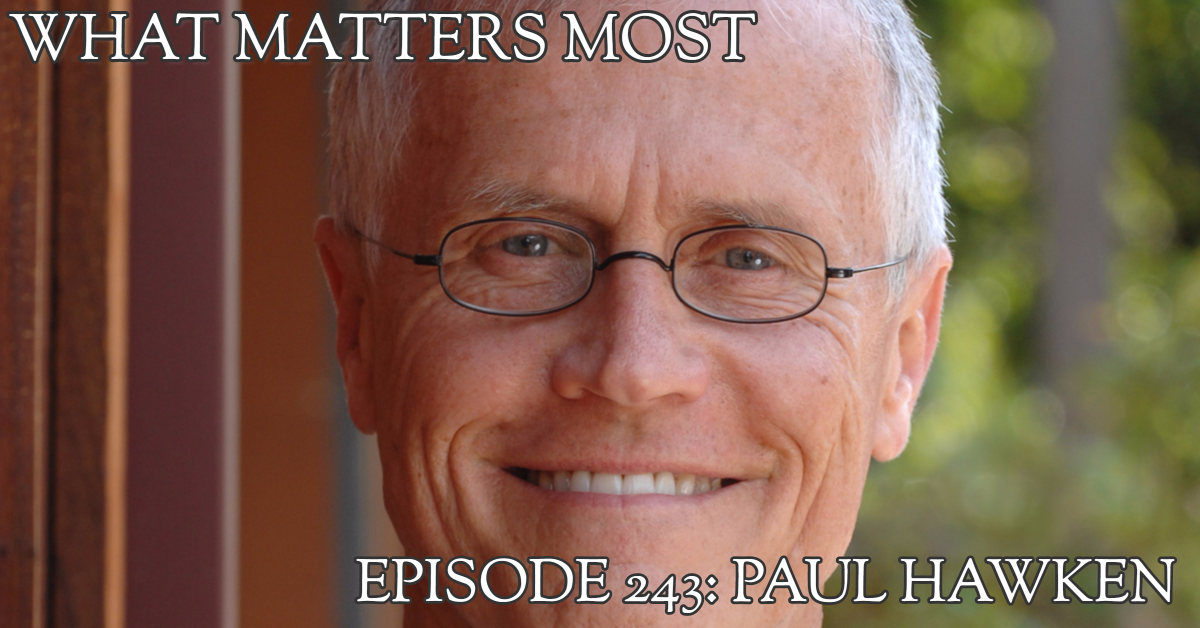

Paul Hawken is an environmentalist, entrepreneur, author and activist who has dedicated his life to environmental sustainability and changing the relationship between business and the environment. Relationship to the environment and one another.” - Viking Press Fundamentally, it is a description of humanity's collective genius, and the unstoppable movement to reimagine our A culmination of Hawken's many years of leadership in the environmental and social justice fields, it will inspireĪnd delight any and all who despair of the world's fate, and its conclusions will surprise even those within the movement itself. and is emerging to be an extraordinaryĪnd creative expression of people's needs worldwide.Įxplores the diversity of the movement, its brilliant ideas, innovative strategies, and hidden history, which date back many centuries. Like nature itself, it is organizing from the bottom up, in every city, town, and culture. From billion-dollar nonprofits to single-person dot.causes, these groups collectively comprise the largest movement onĮarth, a movement that has no name, leader, or location, and that has gone largely ignored by politicians and the media. “Paul Hawken has spent over a decade researching organizations dedicated to restoring the environment and fostering social justice. Grazing can surely learn enough in these pages to apply well-reasoned pressure.” - Publishers Weekly But readers with a capacity for judicious browsing and

Whether all that the authors have organized and presented so earnestly here can be assimilated and acted on by the people who run the world is open to question. It belongs to the galvanizing tradition of Frances Moore Lappe’s

In looking at options for transportation (including the development of ultralight, electricity-powered automobiles), energy use, building design, andwastereductionanddisposal,the book'sreach is phenomenal. Hawken and the Lovinses acknowledge such barriers as the high initial costs of some techniques,lackofknowledgeofalternatives,entrenched ways of thinking and other cultural factors. ”Hawken ( The Ecology of Commerce) and.the Rocky Mountain Institute, an environmental think tank, have put together an ambitious, visionary monster of a book… The authors have two related goals: first, to showthevastarrayofecologicallysmart options available to businesses second, to argue that it is possible for society and industry to adopt them. How might millions of people live and work in a complex business environment while causing ‘as little suffering as possible to all and everything around us?’ Hawken, no Luddite, believes that ‘we need a design forīusiness that will ensure that the industrial world as it is presently constituted ceases and is replaced with human-centered enterprises that are sustainable producers.’ Avoiding stormy rhetoric, Hawken thoughtfully reviews ecological theories andĭisasters and insists that ‘ecology offers a way to examine all present economic and resource activities from a biological rather than a monetary point of view.’ Calling for a restorative economy, he proposes rational, achievable goals: stopĪccelerating the rate that we draw down capacity’ refrain from ‘buying or degrading other people’s environment’ and avoid displacing ‘other species by taking over their habitats.’ This noteworthy study should kindle debates within the business The purpose of business, he points out, is not to take risks but rather to get something done.”. He dispels the myth of the risk-taking entrepreneur. The most successful business, your idea forĪ business, will grow from something that is deep within you, something that can’t be stolen by anyone because it is so uniquely yours that anyone else who tried to execute your idea would fail. Using examples like Patagonia, Ben & Jerry’s Homemade Ice Cream, and University National Bank of Palo Alto, California, Hawken shows that the successful business is an expression of an individual person. And he wrote a critically acclaimed book called The Next Economy about the future of the economy. More recently, he founded Smith & Hawken, the premier mail-order garden tool company. In the early 1970s, while he was still in his twenties, he founded Erewhon, the largest distributor of natural foods. He knows what he’s talking about he is his own best example of success. Paul Hawken-entrepreneur and best-selling author-wroteįor those who set out to make their dream a reality. Many of them fail, but enough succeed so that small businesses are now adding millions of jobs to theĮconomy at the same time that the Fortune 500 companies are actually losing jobs. In fact, 1,000,000 businesses start in the United States every year. “Nearly everyone harbors a secret dream of starting or owning a business.


 0 kommentar(er)
0 kommentar(er)
